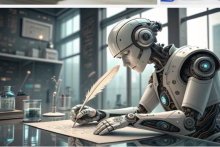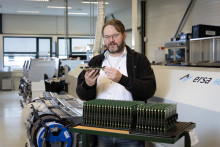'The student who comes to us still has the same question,' Stukker begins. 'They have graduated, have a master's degree, but what can you actually do with that? And what do I want? Artificial Intelligence helps us to personalise career advice.’
 Where coaches used to fall back on standard models or their experience, they can now use tools that provide insight into the labour market. By entering the right prompt and asking good questions, an AI tool shows which positions match a person's degree and skills. Stukker: 'It makes the job search easier. It gives suggestions based on study and comes up with concrete positions and vacancies.'
Where coaches used to fall back on standard models or their experience, they can now use tools that provide insight into the labour market. By entering the right prompt and asking good questions, an AI tool shows which positions match a person's degree and skills. Stukker: 'It makes the job search easier. It gives suggestions based on study and comes up with concrete positions and vacancies.'
Stukker sees AI mainly as a useful brainstorming tool. 'It's there, we use it and check whether the outcome is valid. At the Digitalisation Committee of the National Network of Career Services, of which I am a member, we exchange experiences and explore how artificial intelligence affects our work and what benefits we can do with it.'
One of those advantages is the use of AI when preparing a resume. Or, as Stukker says, when writing a small profile text on LinkedIn. 'Which you can do by introducing some qualities and soft skills.’
While AI provides powerful tools for finding a job, the role of the career coach remains indispensable. Technology can analyse data and match functions, but it does not understand emotions, doubts or personal motivations. Stukker: 'We still have the real conversation, we sense and ask further questions. An AI tool can't do that.'
A critical note
Kim Middel, Co-ordinator of Translations and Editing at the UT Language Centre Places a critical note on the use of AI. The lack of attention to privacy worries Middel. 'The moment you run a text through a translation machine or AI-tool, it is on the internet. How is privacy upheld? What guarantees do you have? People should consider carefully what information they do and do not share, such as scientific or personal data.'
When using AI, in addition to the fact that the programs independently change texts, issues around privacy and data protection are a point of attention. ChatGPT offers no guarantees for this. Microsoft Copilot is not licensed under the same license as other Microsoft programs; this requires a separate license, which Dutch universities and fellow universities s do not have because of the high costs and problems with data protection. Privacy is therefore not guaranteed at Copilot either, and serious problems with data security have been identified. So think carefully about what information you share with AI and what you don't.
4tu career special
 This article appeared in the 4TU Career Special, a shared publication by the news editors of Cursor TU Eindhoven (Technische Universiteit Eindhoven University of Technology), TU Delta (TU Delft University of Technology), Resource Wageningen UR (Wageningen University & Research) and U-Today (University of Twente).
This article appeared in the 4TU Career Special, a shared publication by the news editors of Cursor TU Eindhoven (Technische Universiteit Eindhoven University of Technology), TU Delta (TU Delft University of Technology), Resource Wageningen UR (Wageningen University & Research) and U-Today (University of Twente).
The magazine came into being in collaboration with industry, and is explicitly aimed towards students who are either in the final phase of their studies, or have just graduated.








